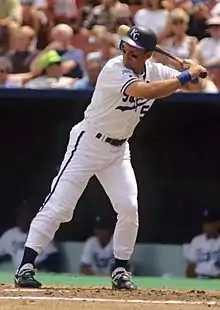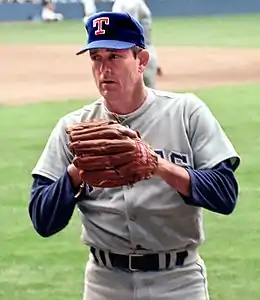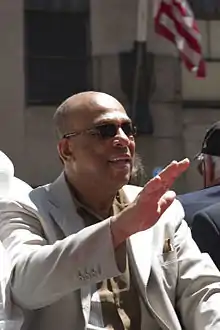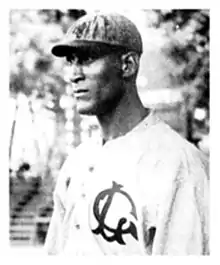1999 Baseball Hall of Fame balloting
Elections to the Baseball Hall of Fame for 1999 followed the system in use since 1995. The Baseball Writers' Association of America (BBWAA) voted by mail to select from recent major league players and elected three: George Brett, Nolan Ryan, and Robin Yount. The Veterans Committee met in closed sessions and selected four people from multiple classified ballots: Orlando Cepeda, Nestor Chylak, Frank Selee, and Joe Williams.
| 1999 Balloting for the National | |
|---|---|
| New inductees | 7 |
| via BBWAA | 3 |
| via Veterans Committee | 4 |
| Total inductees | 244 |
| Induction date | July 25, 1999 |
Baseball Hall of Fame balloting | |
«1998 2000» | |
| Top row, L-R: George Brett, Nolan Ryan, Robin Yount, Orlando Cepeda. Bottom row, L-R: Nestor Chylak, Frank Selee, Joe Williams. |
Brett, Ryan, and Yount were all newly eligible, as they each played their last game in 1993. It was the first time the writers elected more than two first-ballot candidates, other than the five players selected for the inaugural class of 1936.[1]
Induction ceremonies in Cooperstown, New York, were held on July 25, 1999, with George Grande as master of ceremonies with Commissioner of Baseball Bud Selig in attendance.[2]
BBWAA election
The BBWAA was authorized to elect players active in 1979 or later but not after 1993 (final game, 1979 to 1993). There were 28 candidates, 17 returning from the 1998 ballot, where they received at least 5% support, and 11 on the ballot for the first time (†), chosen by a screening committee from players who last appeared in 1993. All 10-year members of the BBWAA were eligible to participate by voting for as many as 10 candidates; any candidate receiving votes on at least 75% of the ballots returned would be honored with induction to the Hall.
Results were announced on January 5, 1999. A total of 497 ballots were cast so 373 votes were required for election. A total of 3348 individual votes were cast, an average of 6.74 per ballot. Candidates who received less than 5% support, or 25 votes, would not appear on future BBWAA ballots (*). They were also eliminated, at the time, from future consideration by the Veterans Committee.[lower-alpha 1]
Three players were elected and 16 who last played during 1980–93 were forwarded to next year. Mickey Lolich and Minnie Miñoso were on the ballot for the 15th and final time, although Miñoso's term as a candidate was not consecutive.
|
|
The field of newly eligible candidates, who played their last games during 1993, included 19 All-Stars (ten on the ballot) with a total of 63 All-Star selections. Some of them were 13-time All-Star George Brett, 11-time All-Star Carlton Fisk, 8-time All-Star Nolan Ryan and 7-time All-Star Dale Murphy. There were two Most Valuable Players in the field (Brett, Murphy, Robin Yount and George Bell, of whom Murphy and Yount won two MVPs) and two Rookies of the Year (Fisk and Alfredo Griffin).
The newly eligible players who did not reach the ballot were Juan Agosto, Wally Backman, Steve Balboni, Randy Bush, Iván Calderón, Henry Cotto, Glenn Davis, Ken Dayley, Frank DiPino, Bill Doran, Dan Gladden, Alfredo Griffin, Kelly Gruber, Neal Heaton, Steve Lake, Terry Leach, Bob McClure, Gene Nelson, Pete O'Brien, Geno Petralli, Ted Power, John Russell, Bryn Smith, Tim Teufel, Dickie Thon, José Uribe, Bob Walk, Chico Walker, Curtis Wilkerson, Glenn Wilson, Curt Young, and Matt Young.
Veterans Committee
The Veterans Committee met in closed sessions to elect as many as two executives, managers, umpires, and older major league players—the categories considered in all its meetings since 1953.
The older players eligible were those with ten major league seasons beginning 1945 or earlier; those who received at least 100 votes from the BBWAA in some election up to 1990; and those who received at least 60% support in some election beginning 1991. Players on Major League Baseball's ineligible list were also ineligible for election.
By an arrangement since 1995 the committee separately considered candidates from the Negro leagues and from the 19th century with authority to select one from each of those two special ballots. It elected four people, the maximum number permitted: first baseman Orlando Cepeda from the 1960s, umpire Nestor Chylak, pitcher Smokey Joe Williams from the Negro leagues, and manager Frank Selee from the 19th century.
J. G. Taylor Spink Award
Bob Stevens received the J. G. Taylor Spink Award honoring a baseball writer. (The award was voted at the December 1998 meeting of the BBWAA, dated 1998, and conferred in the summer 1999 ceremonies.)
Ford C. Frick Award
Arch McDonald posthumously received the Ford C. Frick Award honoring a baseball broadcaster.[3]
Notes
- Arrangements for inducting "veteran" players, those inactive for about 25 years or more, have since been revised. Since 2001, a player's eligibility for the veterans ballots does not depend on performance in the BBWAA elections.
References
- "Ryan, Brett, Yount in Hall of Fame". Chicago Tribune. January 5, 1999. p. 71. Retrieved October 23, 2019 – via newspapers.com.
- Lucas, Mike (July 26, 1999). "What a day for The Kid". The Capital Times. Madison, Wisconsin. p. 1B. Retrieved October 23, 2019 – via newspapers.com.
- "'Right down Broadway' for broadcaster McDonald". The Tennessean. Nashville, Tennessee. February 6, 1999. p. 2C. Retrieved October 23, 2019 – via newspapers.com.
External links
- 1999 Election at www.baseballhalloffame.org
- 1999 Hall of Fame Voting at Baseball-Reference






